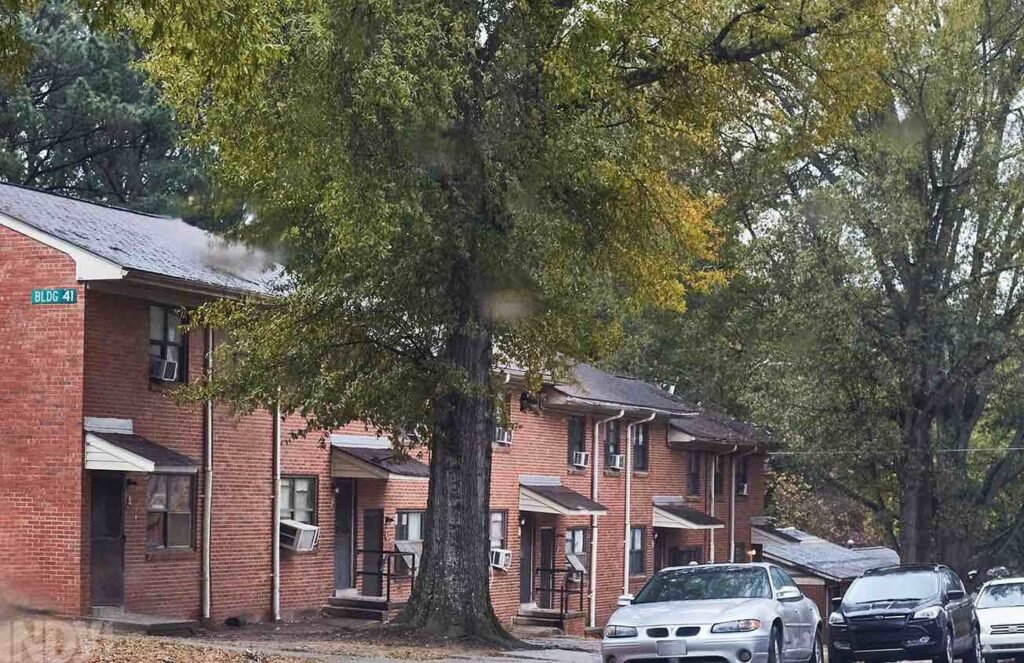Durham, North Carolina, is grappling with an escalating affordable housing crisis, characterized by rising housing costs, increasing homelessness, and significant challenges in meeting the housing needs of its low-income residents. This article examines the current state of affordable housing in Durham, recent initiatives aimed at addressing the crisis, and the obstacles that persist.
Current Housing Landscape
As of 2024, Durham has witnessed a substantial increase in housing costs, with Fair Market Rents (FMR) for a modest two-bedroom apartment rising by 38% between 2019 and 2023. This surge has led to a significant portion of the population becoming cost-burdened, meaning they spend more than 30% of their income on housing. In Durham County, an income of $65,240 per year is now needed to afford the FMR for a two-bedroom unit.
The city’s population growth has further strained the housing market. Durham’s population has increased by approximately 25% over the past decade, intensifying the demand for affordable housing. This demand has outpaced supply, exacerbating the affordability crisis.
Recent Initiatives and Developments
To combat the affordable housing shortage, Durham has launched several initiatives:
• Forever Home, Durham: This is a $160 million, multi-year investment in affordable housing and services for low-income residents, funded through a combination of a $95 million Affordable Housing Bond and $65 million in existing city and federal funds. The program aims to build 1,600 new affordable rental homes, preserve 800 affordable rental homes, and provide 400 affordable homeownership opportunities for first-time buyers.
• Fayette Place Redevelopment: A significant project in the Hayti District, Fayette Place is set to include 565 housing units, with construction on the first phase expected to begin in 2025. This development is a partnership between the Durham Housing Authority (DHA) and Durham Community Partners, aiming to revitalize a historic neighborhood and increase affordable housing availability.
• Commerce Street Apartments: Supported by a $40 million Choice Neighborhoods Initiative Grant from the U.S. Department of Housing and Urban Development, this project involves the demolition of existing public housing units and the construction of new mixed-income housing. Demolition is expected to be completed by December, with construction beginning in early 2024.
Challenges and Criticisms
Despite these efforts, challenges remain:
• Rising Homelessness: The city has seen an increase in homelessness since the onset of the COVID-19 pandemic. A 2024 report by Durham’s Community Development Department noted that the number of people facing homelessness rose from 361 in 2019 to 415 in 2024.
• Luxury Apartments and Vacancy Rates: While thousands of luxury apartments have been constructed, many remain vacant, highlighting a mismatch between housing availability and affordability. This disparity underscores the need for housing that meets the financial realities of Durham’s residents.
• Leadership Changes: The recent departure of DHA CEO Anthony Scott adds uncertainty to the future direction of affordable housing initiatives. Scott’s tenure was marked by significant projects aimed at addressing the housing crisis, and his exit may impact the momentum of these efforts.
Community Concerns
Advocates have raised concerns about the adequacy of current measures. For instance, the Coalition to End the HIV Epidemic in Durham has criticized the city’s response to housing needs for people with HIV and AIDS, citing administrative deficiencies and staffing issues that hinder access to necessary care.
Durham’s affordable housing crisis is a multifaceted issue requiring sustained effort, investment, and collaboration among city officials, community organizations, and residents. While initiatives like Forever Home, Durham, and various redevelopment projects represent significant steps forward, the challenges of rising costs, increasing homelessness, and ensuring equitable access to housing persist. Ongoing community engagement and transparent leadership will be crucial in navigating the path toward a more affordable and inclusive Durham.
For comprehensive coverage of housing developments and community issues in Durham, subscribe to the Bull City Citizen, your trusted source for in-depth local reporting.












